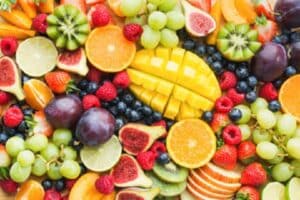Correct Way to Eat Fruits
Eating fruits is an essential part of a healthy and balanced diet. They are rich in vitamins, minerals, fiber, and antioxidants, which provide numerous health benefits. While there isn’t necessarily a “correct” way to eat fruits, there are some general guidelines that can help you make the most of their nutritional value and enjoy them to the fullest. various aspects of fruit consumption, including selection, preparation, serving, and storage, to help you maximize the benefits of incorporating fruits into your diet.
Fruit Selection:
Choose ripe fruits: Look for fully ripe fruits, as they tend to be sweeter, juicier, and more flavorful. Ripe fruits are usually firm but yield slightly to gentle pressure.
Consider seasonal fruits: Seasonal fruits are often fresher, more flavorful, and more affordable. They also support local agriculture and are more likely to be available without excessive transportation or storage.
Variety is key: Aim to consume a diverse range of fruits to obtain a wide spectrum of nutrients. Different fruits offer distinct health benefits, so mix them up and explore new options.
Fruit Preparation:
Wash fruits thoroughly: Rinse fresh fruits under cool running water before consuming them. This helps remove dirt, bacteria, and potential pesticide residue.
Peel or not to peel: Some fruits have edible peels, while others require peeling. Apples, pears, and peaches, for example, can be enjoyed with their skin intact, which provides additional fiber and nutrients. Citrus fruits and bananas, on the other hand, typically require peeling.
Remove any inedible parts: Remove seeds, pits, and tough stems from fruits that have them. These parts can be unpleasant to eat or even harmful in some cases.
Fruit Serving:
Fresh or dried: Fresh fruits are a popular choice, but dried fruits can also be a nutritious option. Dried fruits have concentrated natural sugars, so it’s important to consume them in moderation.
Slicing and dicing: Cut larger fruits into smaller, bite-sized pieces for easy consumption. This can be particularly useful for children or individuals with difficulty chewing.
Fruit salads: Combine different fruits to create refreshing and colorful salads. You can mix them with yogurt, sprinkle some nuts or seeds, or add a touch of honey for added flavor.
Fruit Consumption:
Eat fruits as a snack: Fruits make a great snack option between meals. They provide natural sugars for quick energy and can help satisfy cravings for sweets.
Include fruits in meals: Add fruits to your meals in various ways. For example, you can top your cereal with sliced bananas, mix berries into your yogurt, or incorporate diced fruits into salads or stir-fries.
Juice in moderation: While fresh fruit juice can be a good source of vitamins, it lacks the fiber content of whole fruits. If consuming juice, opt for freshly squeezed or 100% natural juices and limit the quantity to avoid excessive sugar intake.
Fruit Storage:
Refrigerate when needed: Some fruits, like berries, grapes, and cherries, are best stored in the refrigerator to maintain freshness. Others, like bananas and citrus fruits, can be stored at room temperature.
Avoid prolonged storage: Fruits are at their peak of freshness and nutritional value when consumed soon after ripening. Try not to store them for extended periods, as they may lose flavor and nutrients over time.
Freezing fruits: When fruits are overly ripe, consider freezing them to prevent wastage. Frozen fruits can be used later for smoothies, toppings, or desserts.
Remember to consult with your healthcare provider or a registered dietitian for personalized dietary advice, especially if you have specific dietary restrictions or health concerns.
Tags: when to eat fruits, fruits, best time to eat fruits, fruits to eat during pregnancy,right time to eat fruits,fruit,fruit diet,how to eat fruits,fruits not to eat in pregnancy,best time to eat dry fruits,fruits to be avoided during pregnancy,best way to eat fruits,right way to eat fruits,dry fruits,right way to eat dry fruits,worst time to eat fruits,how to eat dry fruits,how many fruits to eat per day,how to eat fruits 2018
